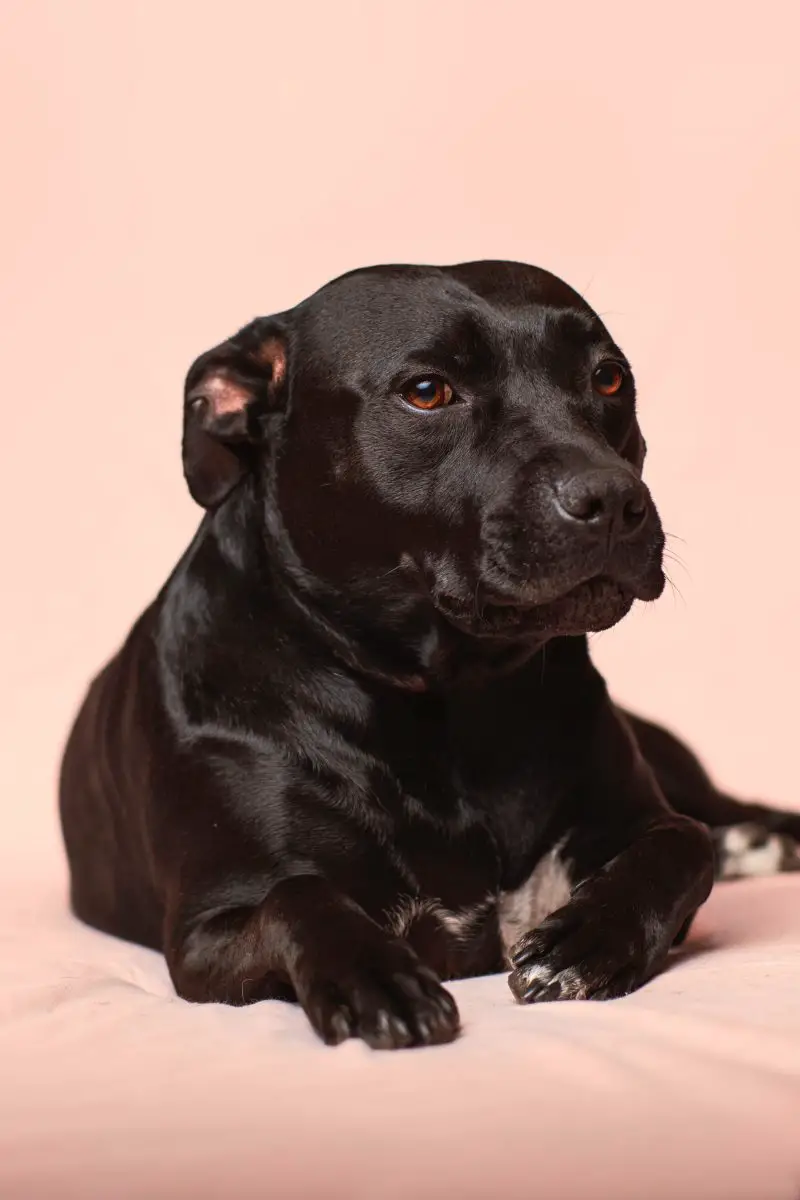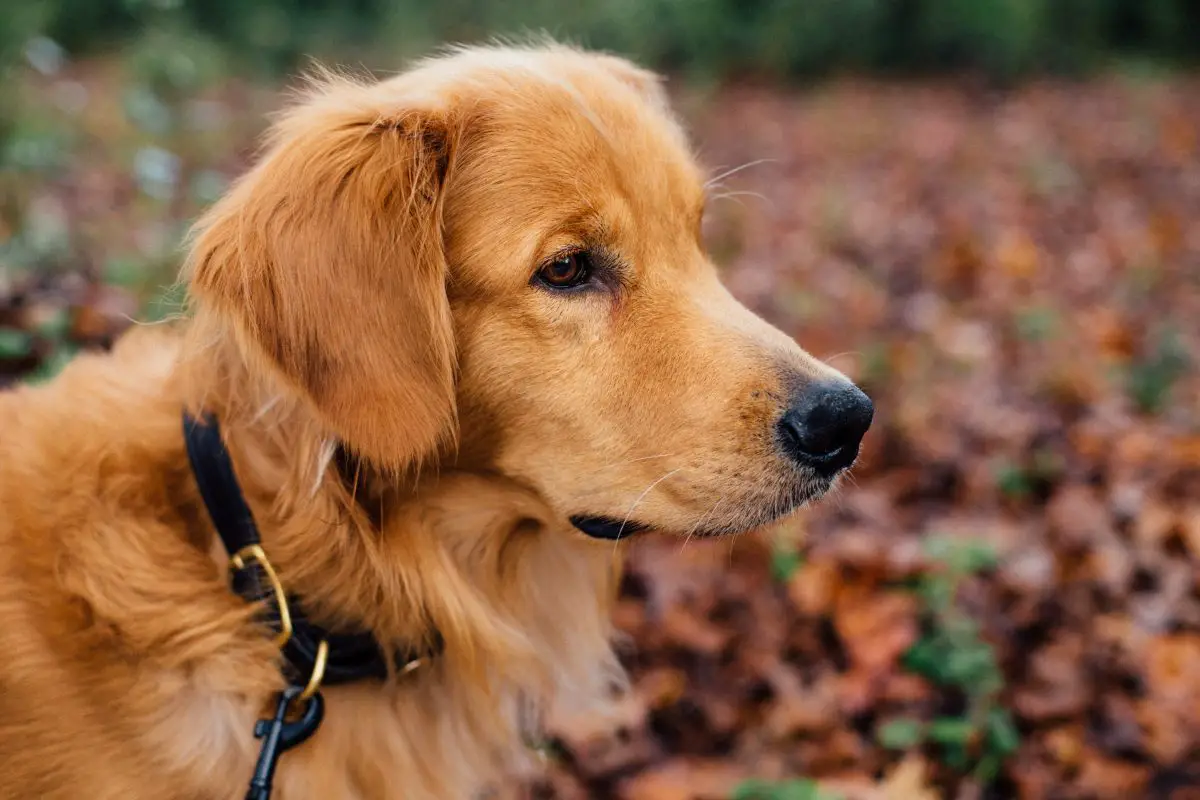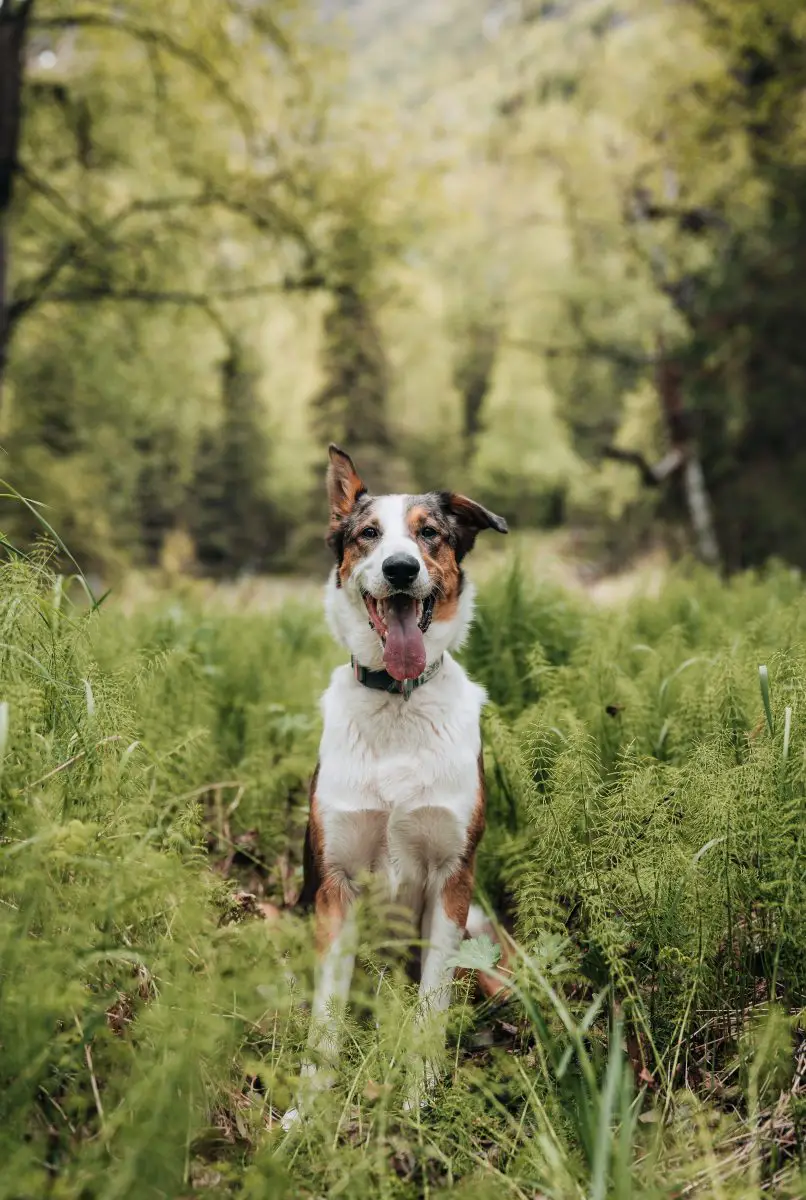When your dog has diarrhea but is acting fine, your tummy can be churning, too. Meanwhile, as you care for your dog, your mind overflows with questions. I understand fully, having been in your shoes.

Most likely, your foremost concerns are:
- How do I stop the episodes?
- Should I call my vet or wait to see if they subside?
- Is my dog going to be okay?
In this post, I explain the possible reasons for your dog’s symptoms. You’ll learn when it’s safe to pursue home treatment and when to seek a vet’s diagnosis and care. By this, you’ll be able to think clearly, helping your precious dog to heal. Here are answers to those troubling questions.
Table of Contents
- Why is my dog acting normal but having diarrhea?
- Why does my dog have diarrhea with no other symptoms?
- How long does stress diarrhea last?
- When should I be concerned about my dog’s diarrhea?
- Can dogs have random diarrhea?
- Colored Dog Diarrhea
- What if my dog has diarrhea but is eating and acting normally?
- My dog has diarrhea yet wants food.
- Why is my dog having gas with diarrhea but acting normal?
- Why does my dog have explosive diarrhea but seem okay otherwise?
- What to do if my dog has explosive diarrhea but is acting fine?
- How long does diarrhea last in a dog?
- What constitutes a medical emergency?
- When is it safe to treat my dog’s diarrhea at home?
- FAQs
Why is my dog acting normal but having diarrhea?
Diarrhea occurs when food moves through the colon too fast. The speed prevents the colon from absorbing water, and it gets passed into the stool.
Below are five common triggers of diarrhea.
1. Scavenger Habits
As you know, when your back is turned, your dog can wolf down anything harmful. Indoors, the smell of kitchen garbage can lure your pup to investigate. Then, if they eat spoiled food from the trash, it can spawn diarrhea. So can ingesting bones, fabric, and toys.
Outdoors, some dogs go after compost. Of course, their digestive systems protest, kicking out the decaying plant matter.
2. Anxiety
Can you trace the onset of diarrhea to a stressful event in your dog’s life? If so, anxiety may be responsible. In turn, your dog feels insecure.
Situations that often frighten dogs are:
- being home alone
- strange or loud noises
- grooming appointments
- seeing the vet
- kennel boarding
- the sudden absence of a family member
- a new baby in the house
3. Low-Quality Food
Cheap dog food can deplete the healthy bacteria in your pup’s digestive tract. These essential microbes help your dog digest foods and absorb their nutrients. Often, poor-quality dog food has too much fiber, inflaming a dog’s intestines.
Loose stools can also result if your dog eats table scraps, especially greasy fare.
4. Dietary Changes
Did you recently switch your sweet pea to a new dog food? If so, your pup’s beneficial gut bacteria may be struggling to adapt, evidenced by diarrhea.
Vets recommend easing into a new diet across seven days. Below is a general guideline.
- Days one and two – ¼ new food and ¾ prior food.
- Days three and four – half new food and half the former brand.
- Days five and six – ¾ new food and ¼ previous food.
- Day seven – new formula.
Meanwhile, each day, track your cutie’s response to the change. With high-quality dog food, such as a prescription formula, your pup may need more time to adjust. This can be true of dogs with food allergies, sensitive tummies, and gastrointestinal diseases.
So, go slower if your dog has diarrhea, vomiting, or a loss of appetite. After two weeks, if your dog still can’t process the new formula, tell your vet.
5. Germs and Gut Parasites
Nasty bacteria such as E. coli can infect your pup, launching diarrhea. So can viruses, such as distemper. Unvaccinated puppies are especially vulnerable to parvovirus. Plus, since puppies lick and chew anything in sight, they often get worms.
Even antibiotics to treat infections can induce runny stools.
Do you ever take your pup to a dog park, groomer, or boarding kennel? If so, they can pick up germs from sick or unvaccinated pets. That’s why it’s vital to stay up-to-date with preventive vaccines.
6. Other Medical Conditions
Diarrhea is a symptom of:
- liver and kidney disease
- autoimmune disorders
- intestinal cancer
- inflammatory bowel disease (IBD)
- pancreatitis
- endocrine disorders

Why does my dog have diarrhea with no other symptoms?
There are three possible reasons.
- The loose bowels are stress-related.
- The cause of diarrhea involves their colon and no other organs.
- Hidden problems are brewing, having yet to manifest.
How can you tell if anxiety is at fault? Once you eliminate the stressor or reduce its effect, your dog’s bowel movements normalize.
For instance, let’s say you have a new job, requiring more time away from home. In that case, before leaving, give your pup a few captivating toys. Chew toys, in particular, can help your dog release tension.
Also, put a T-shirt or sock you’ve recently worn in your dog’s bed. This way, your scent will calm your cutie, helping them feel secure.
Upon arriving home, greet your pup with plenty of praise, hugs, and petting. Also, reserve time in your schedule for daily play.
How long does stress diarrhea last?
The duration hinges upon two factors:
- how fast you remove or lessen the source of fear
- how soon the intestinal inflammation resolves
Once you address both matters, healing can occur within three to five days.
Meanwhile, depending on your dog’s size, they may benefit from a 12-hour break from food. This pause gives the digestive system a chance to rest and reboot.
Is your dog a large breed? If so, they can likely handle a brief fast. However, if you have a small pet, they won’t have the stamina to miss any meals. Neither will a senior dog or a puppy less than 9 months old. Instead, they need the nutrition in food to recover.
While your dog has diarrhea, give bland foods until the stools get firmer. Ideal options are boiled, skinless chicken, ground turkey, canned pure pumpkin, and white rice.
Also, ensure that your pup has fresh water throughout the day. Otherwise, the loss of fluids in their stool will cause dehydration.
Tip – If your pup turns away from plain water, flavor it with low-sodium chicken broth.
When should I be concerned about my dog’s diarrhea?
Rush your dog to a vet if they are:
- vomiting
- passing blood or worms in their stool
- drooling excessively
- overdue with protective vaccines
- less than 9 months old
Also, heed the following behavioral red flags:
- moaning or whimpering in pain
- hiding
- growling or shrinking when you approach
- trembling or pacing
- uncharacteristic irritability
- weakness or lethargy
- refusing water
Likewise, be alert to evidence of dehydration:
- dry, droopy eyes
- tacky or parched gums
- dry nose
Extreme fluid loss can lead to kidney failure, unconsciousness, and even death. Thus, at the first clue of dehydration, call your vet.
Should I worry if my dog has diarrhea but is acting fine?
Have the loose stools continued for two days? If so, call your vet’s office for a prompt appointment. Then, on exam day, collect a stool sample, bringing it with you. This way, the doctor can test for hidden blood and internal parasites.
Depending on the test results, the vet may prescribe a dog food for digestive problems. The doctor may also give medication to kill an infection, soothe the colon, or slow food motility.
Moreover, the vet may prescribe a probiotic supplement. It will plant colonies of healthy bacteria in your dog’s digestive tract.

Can dogs have random diarrhea?
Yes, in two instances.
1. Nocturnal Episodes
Some pups have normal bowel movements during the day, then diarrhea at night. Vets aren’t sure why certain dogs have nocturnal diarrhea and not others. Still, it can correlate to late afternoon or evening:
- exercise
- meals and treats
- over-excitement
These stimuli can upset a dog’s tummy at a time when they should be resting. Thus, after sunset, ensure calming activities for your pup, helping them decompress.
2. Undiagnosed Illness
Additionally, random episodes of diarrhea can flag a medical problem. This is especially the case in puppies, elderly pets, and dogs with impaired immunity.
So, if loose bowels are chronic and sporadic, make an appointment with your vet. Then, on exam day, bring a recent stool sample with you.
Colored Dog Diarrhea
What if my dog has diarrhea with mucus but acts normal?
Mucus can hint of colitis, an inflammation of the large intestine. Colitis has a broad range of causes. It can stem from:
- eating spoiled food
- food allergies
- worms
- intestinal infection
- bowel disease
- dealing with stress
Why is my dog having orange diarrhea but acting normal?
The orange color may come from your dog’s diet.
Or, the hue can reflect the fast transit of food through the intestines. With normal digestion, stools absorb a brown pigment released by the liver.
Should I worry if my dog has bloody diarrhea but seems fine?
Yes, this is a pet emergency! Bloody stool means there’s bleeding in your dog’s digestive tract. It can be due to:
- a stomach ulcer
- injury from eating sharp objects, such as bones
- bacterial or viral infection
- internal parasites
- gastrointestinal cancer
What if my dog has diarrhea but is eating and acting normally?
Even if your pup seems okay, call your vet if the runny stools last two days. By this time, if your dog had eaten spoiled food, the diarrhea should have stopped. For persistent loose bowels, always call your vet.
Meanwhile, don’t give an over-the-counter drug unless your vet advises one. Many human medications can be toxic to pets.
My dog has diarrhea yet wants food.
A hearty appetite is a good sign! Still, feed your pup bland foods until their stools solidify.
What to give a dog with diarrhea to stop it?
For three days, try feeding your pup the following.
Plain meat, white rice, and canned pure pumpkin.
Mix equal amounts boiled, skinless chicken or ground turkey and white rice. Next, add a teaspoon of pure pumpkin. Its fiber can help to firm up loose stools. Avoid giving pumpkin pie filling, as the spices and sugar will further upset your dog’s tummy.
Start with a ¼-cup serving of the mixture, noting whether your cutie retains it. If so, offer additional small portions, as tolerated, up to six times a day. Vets advise limiting the total food volume to 25 percent of your dog’s normal intake.
That’s because large meals stretch your dog’s stomach, sending signals to contract, promoting defecation. So, it’s best to be cautious, feeding your pup a little at a time. Again, this is a short-term measure, only for three days.
Scrambled Egg
As a snack, give your pup an egg scrambled without oil. The easily digested protein will help to bind your dog’s stool.
When should I resume my dog’s regular diet?
After three days, slowly reintroduce regular dog food, a high-quality formula. Your vet can offer guidance and recommendations. You can also adapt the schedule above designed for starting a new diet.
- Days one and two – ¼ bland food mixture and ¾ healthy dog food.
- Days three and four – half bland food and half healthy dog food.
- Days five and six – ¾ healthy dog food and ¼ bland.
- Day seven – all high-quality dog food.
Meanwhile, avoid giving your dog treats.
After the week-long transition diet, does your dog still have diarrhea? If so, go back to giving bland foods for 24 hours. If your dog is no better by the following day, call your vet.
On the other hand, have your dog’s bowel movements normalized? If so, that’s great! Then, after two weeks of giving regular dog food, you can slowly reintroduce treats.
Why is my dog having gas with diarrhea but acting normal?
Below are five possible causes.
1. Cheap Dog Foods
Often, they’re loaded with poorly digested proteins and carbs.
2. Dietary Change
A sudden switch to new dog food can overload your pup’s beneficial gut bacteria, triggering gas and liquid stools.
3. Grazing on Garbage
Thwart your dog’s trash can raids, securing the bins with lids or latches.
Then, during walks, steer your pup away from waste on the ground. Also, use distraction with a squeaky toy. Whenever your dog pursues something yucky, divert their attention with several squeaks.
4. Food Intolerance
Along with gas and diarrhea, symptoms include:
- hair loss
- hives and itchy skin
- recurrent ear infections
5. Medical Conditions
Bloat often accompanies colitis, worms, intestinal cancer, pancreatitis, and IBD. Typically, these illnesses also render pain. So, if your pup shows signs of hurting, obtain urgent veterinary care.
Why does my dog have explosive diarrhea but seem okay otherwise?
This symptom points to a problem in the small intestine. Inflammation or infection may cause fluids to build. Your pup has no choice but to release them. Here’s what often propels forceful diarrhea.
1. Food Issues
Does your cutie tend to gobble their food, eating too fast? If so, they’re also swallowing air, producing intestinal gas. Likewise, explosive diarrhea can stem from food intolerance or an abrupt switch to new dog food.
2. Internal Parasites
If your dog licks or eats things off the ground, they can acquire worms.
3. Bacterial Infection
Rotten food harbors infectious microbes, such as Salmonella. Such bacteria rouse intestinal swelling, provoking runny stools.
4. Certain Diseases
Pancreatitis and IBD can generate explosive diarrhea.
NOTE – If mild diarrhea isn’t treated, it can turn violent with time. This occurs when harmful bacteria overpower the healthy ones. In turn, B vitamins plummet, triggering forceful, runny stools.
What to do if my dog has explosive diarrhea but is acting fine?
Use the treatment for stress-induced diarrhea, as above. To review, if you have a large breed, withhold food for 12 hours, followed by a bland diet. For a small dog, skip the fast. Instead, proceed with small portions of the bland foods. Meanwhile, always guard against dehydration with ample fresh water.
After two days, if the diarrhea persists, bring your pup to a vet. However, don’t wait that long if your dog refuses water, vomits, or has bloody diarrhea. Instead, go immediately to an animal hospital for an emergency exam.
Also, to promote healing, give your dog a quiet, comfortable haven in which to rest. Choose a spot away from busy foot traffic and household activity. This caring strategy will lessen your dog’s anxiety.
Above all, never scold or punish your pup for their accidents. Diarrhea is beyond their control.
How long does diarrhea last in a dog?
The duration depends on the cause. Here are some customary time frames.
- Eating Spoiled Food – Diarrhea should stop within two days.
- Food Allergies – Inflammation ends when you omit the dietary allergen.
- Internal Parasites – Require vet intervention.
- Bowel Disease – Diarrhea can be recurrent unless medically managed.
- Viral or Bacterial Infection – Stools solidify when germs die.
- Stress – Upon removing the trigger or its effect, diarrhea wanes.
What constitutes a medical emergency?
Your dog needs urgent vet care if they are:
- vomiting
- passing bloody diarrhea
- weak or in pain
- refusing water
- dehydrated – with a dry nose, eyes, or gums
- not current with vaccinations
- behaving abnormally
- an elderly dog or puppy
- in poor health overall
When is it safe to treat my dog’s diarrhea at home?
For two days, try self-management if your dog is:
- acting fine otherwise
- free of other medical conditions
- up-to-date with protective vaccines
- not a senior or a puppy less than 9 months old
Now, when your dog has diarrhea but is acting fine, you know what could be at fault. If you’re unsure of what to do, promptly call your vet’s office. The staff will ably guide you.
With your wise and watchful care, your pup should be better soon!
Other posts about your pup:
FAQs
Not all cases of diarrhea indicate a serious illness. While diarrhea is a common symptom of gastrointestinal upset, there are several factors that can cause a dog to have diarrhea without necessarily being seriously ill.
If your dog’s diarrhea is mild and doesn’t come with other symptoms like vomiting, lethargy, loss of appetite, or bloody stool, you might try withholding food for 12-24 hours and then gradually reintroducing a bland diet. If the diarrhea persists for more than a day, worsens, or is accompanied by other concerning symptoms, it’s important to consult your veterinarian.





